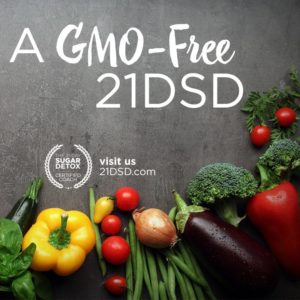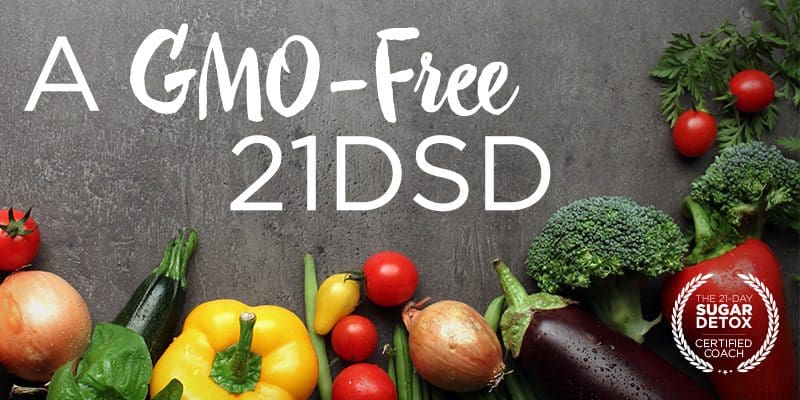Hey Folks! We're excited to welcome back Certified 21DSD Coach Michal Ofer. Michal's article is part of a series contributed by our Certified 21DSD Coaches. Enjoy! – Diane and Team
Following the 21DSD guidelines for the program and beyond is a healthy, sustainable way to nourish your body. There is much talk in the food world about genetically modified organisms (GMOs) and the past decade has shown a huge increase in their use.
The effects of GMOs are not well known or documented and it is thus a wise idea to avoid consuming them as much as possible.
The principles of the 21DSD, and many of the “no” foods on all 3 levels are a sure way of avoiding incorporating any of these foods into your diet.
Not sure what genetically modified organisms are? Looking to keep engineered foods out of your diet? Learn how avoiding GMOs can be beneficial and why knowing where your food comes from can have an impact on your wellness.
 Crops that have been genetically modified are more resistant to pests and disease. They grow bigger. They yield larger plants. Most importantly to us and large chemical companies is that GMO crops are more tolerant to herbicide use. The overuse of GMOs has now created herbicide- resistant super weeds that are requiring the use of even stronger, more harmful chemical herbicides.
Crops that have been genetically modified are more resistant to pests and disease. They grow bigger. They yield larger plants. Most importantly to us and large chemical companies is that GMO crops are more tolerant to herbicide use. The overuse of GMOs has now created herbicide- resistant super weeds that are requiring the use of even stronger, more harmful chemical herbicides.
The incorporation of GMO’s into our food supply is relatively new and there is little to no research concerning their long-term impact on humans. Short term, it appears that GMOs cause no harm, but the majority of these studies have been performed by the companies creating the GMOs and not by independent bodies.
With 94% of soy being genetically modified, and 88% of corn being genetically modified, avoiding GMOs when not following the 21DSD may appear difficult. This is especially the case if you eat many processed foods. So many processed foods contain soy or corn in one form or the other. But, there are tips you can use for avoiding GMOs.
There are a few simple ways to avoid GMOs in your food.
Buy Organic
By definition, organic foods cannot be genetically modified. The easiest way to buy organic is to go down to your local farmers market. Here, you can ensure that the food was grown organically and locally by speaking to the farmers directly and you get to support hardworking, local businesses in the process. If you do not have access to a farmers market look at labels in the food aisles. If you see the USDA’s seal stating that a product is certified organic, you can be assured that it is free of GMOs.
Read Your Labels
Another way of avoiding GMO’s by looking at food labels is to find a butterfly logo on the label. This logo should be accompanied by the text: NON GMO Project VERIFIED nongmoproject.org. This labeling verifies that a product is tested to be GMO free.
Avoid Corn, Soy, Sugar Beets & Cottonseed Oil
Following the principles of the 21DSD and avoiding all products containing corn, soy, sugar (especially from sugar beets) and cottonseed oil will guarantee your diet remains as GMO free as possible. Wheat, although not a GM plant (yet) is sprayed with enormous amounts of chemicals and herbicides before harvesting and is thus best avoided.
Unfortunately, in today’s society, it can be extremely difficult to go to the grocery store and avoid GMOs. Any processed food will likely contain GMOs.
Buying 100% organic verified at the store can create a burden on your wallet. The best way to ensure you are able to stay within your budget is to not buy any processed foods at all. Whole food should be the basic ingredients for your meals, not the other way around. If you have the luxury of space, grow your own garden from organic seeds. If you do not have space, try growing a few plants indoors.
Follow the Environmental working Group’s list of the most important foods to purchase organic to avoid pesticide and herbicide exposure along with GMO’s and know which foods are worth buying organic.
Some simple examples of safe alternatives to GMO-laden foods include:
- Making your own noodle replacement out of spiralized vegetables or use organic spaghetti squash
- Make your own N’oatmeal and Banola for easy, nutritious and delicious pre-packaged cereal replacements.
- Make your own broths and stocks and instead of buying soup, experiment. Make and puree your own.
- Stick with the basics of the 21DSD and its reintroduction protocol for your detox and way beyond!

Michal Ofer is a certified life coach, health coach and 21DSD coach.
She has always had a love for food, cooking and all things nutrition related. Michal grew up in South Africa where she studied biological sciences and got her degree in Optometry with a minor in holistic nutrition. After some travelling, disguised as learning overseas, Michal immigrated to Canada where she worked in business development and team building. A less than positive experience with the current acute care medical system and “Standard American (Canadian) Diet” whilst trying to overcome a chronic health issue led Michal on a path to discovering that food truly is our best medicine and that all healing begins in the gut. Once recovered, Michal wanted to help others reach their optimal level of health, wellness and vitality that a real food approach to diet gives. Michal is a nutritional consultant working with individuals looking to improve their general well-being, with a special emphasis on naturally and holistically healing the damage that disordered eating creates in the entire digestive system. When not counselling others or trying to keep up to date with the online world, Michal is an amateur cook, testing her newest food creations on brave volunteers. She can be reached at [email protected] for further insight into moving beyond eating disorders.


Comments 1
GMOs are so difficult to avoid nowadays, which is why it’s so important that we support our local farmers who only use organic farming. I hope that we can eventually find a way to grow plenty of crops to feed the populations without the use of these GMOs.